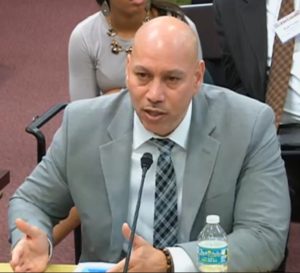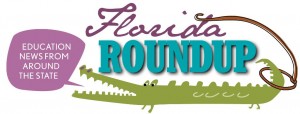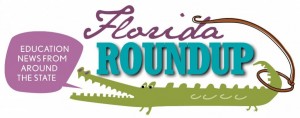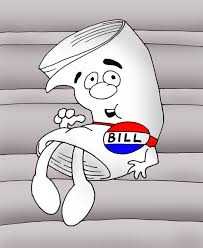Parents and students want options. And, increasingly, Florida school districts are finding ways to offer them. That was the message officials from two large districts brought to state House panel looking at all the state's forms of school choice.

Marc Mora explains Lee County's school choice programs to the Florida House Choice and Innovation Subcommittee.
Marc Mora is chief of staff at the Lee County School district, which has operated an open enrollment program for 20 years. The district is divided into three geographic zones, and assigns families to schools in a lottery. The system is designed to let families choose their schools, and ensure they get an option reasonably close to home. Mora said 82 percent of families get their first choice of school, and 96 percent get one of their top three.
"We know that parents desire a choice of schools, to see a list, to be able to visit during these open-house periods, to meet with the principals, to take a tour, to see what the students and teachers are doing," he said, adding: "We encourage parents to go out to the schools and check them out, because ... every school is unique, and there's a fit for every student."
Since it was first created 20 years ago, Lee County's open enrollment system has helped solve other problems, from helping the district comply with court-ordered desegregation to eliminating the need for endless boundary changes to accommodate constant influxes of new students in fast-growing Southwest Florida.
Open enrollment systems like Lee's are expanding statewide under a new state law that districts are starting to implement. (more…)
Charter schools. A range of charter school proposals are on the table in the state Senate. Sun-Sentinel. A legislative proposal, not yet passed, would allow charter schools to share in local facilities revenue. StateImpact.
Guns. A bill allowing some teachers to carry guns advances in the Legislature. Times/Herald. Scripps/Tribune. Tallahassee Democrat. Sarasota Herald-Tribune.
Teacher pay. Pasco school officials dispute a report saying the district ranks low for teacher pay. Tampa Bay Times.
Testing. More than four-fifths of Florida's students have finished their writing assessments. Extra Credit. Gradebook. Gradebook looks at the impact testing interruptions can have on the validity of results.
Awards. Lee County's Teacher of the Year will be entered into the state competition, after all. Fort Myers News-Press.
Career academies. A Polk County high school announces plans to become a "wall to wall" career academy, awarding industry certifications to all of its more than 1,800 students. Lakeland Ledger.
Labor. A new contract with nurses and athletic trainers draws concern among some parents in the Collier County school district. Naples Daily News.
Tax-credit scholarships. The Ocala Star-Banner looks at what an expansion of the program would mean for local private schools. The Scripps/Tribune Tallahassee bureau takes an in-depth look at the debate over the expansion, and separately reports that supporters are still holding out hope after a measure that would have expanded the program was withdrawn in the Senate. The bill's likely fate inspires both the "winner" and "loser" of the week for the Tampa Bay Times, while Jason Bedrick of the Cato Institute finds a "silver lining." Meanwhile, Joanne McCall of the Florida Education Association argues against the program in the Pensacola News-Journal. A Florida Today editor offers his take on the bill, and what he deems a case of strange bedfellows. The bill was withdrawn due to a dispute over how the state should test children who receive scholarships, Doug Tuthill writes. He is the president of Step Up for Students, which helps administer the program and co-hosts this blog.
Open enrollment. Critics raise concerns about a district-wide school choice proposal in Duval County. Florida Times-Union.
Career Academies. Students try to cope as they await the results of an animal-welfare investigation into a veterinary medicine program in Okaloosa County. Northwest Florida Daily News.
Turnarounds. A Tampa elementary school battles to shake its F grade under close watch from state officials. Tampa Bay Times.
Testing. The Florida Times-Union looks at whether the state's new standardized tests will allow comparisons between Florida students and their peers in other states. Computers will grade the new state writing assessments. StateImpact.
Virtual schools. The Tampa Tribune writes up legislative changes to digital education.
 Charter schools. Several new charters in Jacksonville are moving into old buildings. Florida Times Union. Charter school enrollment in Pinellas is projected to climb 28 percent this fall. Tampa Bay Times (reprise of an earlier Gradebook blog post).
Charter schools. Several new charters in Jacksonville are moving into old buildings. Florida Times Union. Charter school enrollment in Pinellas is projected to climb 28 percent this fall. Tampa Bay Times (reprise of an earlier Gradebook blog post).
Magnet schools. Applications are still being taken for all of Hillsborough's magnet programs except IB. Gradebook.
Career academies. Summer means internships for many of those enrolled in Brevard's business academies. Florida Today.
Low-performing schools. Five of Pinellas' toughest schools hope to begin getting traction this summer. Tampa Tribune. A former student at struggling Lacoochee Elementary in Pasco is now the principal. Tampa Bay Times.
Dual enrollment. Another story on the financial hit to districts from the Legislature's decision to shift dual enrollment costs to them. TCPalm.com.
Teacher evaluations. Not a single teacher in the Palm Beach County School District is rated below effective. South Florida Sun Sentinel.
Teachers. A band teacher's departure from Lake County for a higher-paying gig at a charter in Connecticut is a sign teachers will "seek communities where teachers are respected and education is a priority, and that description doesn't fit either Lake County or Florida." Lauren Ritchie. (more…)
Bang for the buck. Florida's education system gets a lot of it. Florida Watchdog.
 Charter schools. Broward sees its eighth charter school close this year, raising questions about accountability, reports the South Florida Sun Sentinel. The Imagine charter schools network will close its struggling elementary school in Pinellas, but keep its middle school open, reports Gradebook. The C-rated Athenian Academy charter school in Pasco is suing the school district for barring its plans to grow enrollment, reports the Tampa Bay Times.
Charter schools. Broward sees its eighth charter school close this year, raising questions about accountability, reports the South Florida Sun Sentinel. The Imagine charter schools network will close its struggling elementary school in Pinellas, but keep its middle school open, reports Gradebook. The C-rated Athenian Academy charter school in Pasco is suing the school district for barring its plans to grow enrollment, reports the Tampa Bay Times.
Career education. A Pasco student in Wiregrass Ranch High's information technology career academy highlights the potential of choice and career education. Tampa Bay Times. The Tampa Tribune writes up the changes in graduation requirements that put more value on career education.
Dual enrollment. The Palm Beach County school district and Palm Beach State College are hoping to hash out an agreement over dual enrollment costs in the wake of a legislative change. Palm Beach Post.
FCAT. More results coming this week. Gradebook. (more…)
Charter schools. Green light given for golfer Ernie Els' $30 million charter school for children with autism, reports the Palm Beach Post. Students at a Duval charter get a moving lesson in bullying prevention, reports the Florida Times Union.
 Career academies. Fort Meade High School gets four of them. Lakeland Ledger.
Career academies. Fort Meade High School gets four of them. Lakeland Ledger.
School spending. Florida's per-pupil funding isn't as bad as it looks. StateImpact Florida.
School security. The Palm Beach County Sheriff's Office says merging with the district police force wouldn't be a good idea, reports the South Florida Sun Sentinel and Palm Beach Post. Heightened school security is part of the "State of the Schools" address from Orange County School Board Chairman Bill Sublette, reports the Orlando Sentinel. Flagler officials give the sheriff the go ahead to seek a grant to pay for deputies serving in elementary schools, reports the Daytona Beach News Journal.
School grades. A Volusia high school should have been awarded a C rather than a D last year, but missed a deadline for submitting data to the state. Daytona Beach News Journal.
Testing. First big round of FCAT results scheduled for release today. Gradebook.
Cat dissections. South Florida Sun Sentinel.
Parent trigger. Who are Sunshine Parents, a group tied to parent trigger? Tampa Bay Times. More on AnswerSheet. More questions about who signed or didn't sign a petition in support of parent trigger, reports The Buzz.
 Turnaround schools. A number of schools in Pinellas and Hillsborough face prescriptive state intervention plans because they continue to struggle, reports Tampa Bay Times. Finding the right applicants to re-staff Lacoochee Elementary, a similar school in Pasco may be tough, the Times also reports. But don't give up on it, writes a volunteer in a Times op-ed. More from the Tampa Tribune.
Turnaround schools. A number of schools in Pinellas and Hillsborough face prescriptive state intervention plans because they continue to struggle, reports Tampa Bay Times. Finding the right applicants to re-staff Lacoochee Elementary, a similar school in Pasco may be tough, the Times also reports. But don't give up on it, writes a volunteer in a Times op-ed. More from the Tampa Tribune.
Charter schools. Lawmakers agree to give charters $91 million for construction and maintenance, reports the Tampa Bay Times. The Lakeland Ledger writes up the National Alliance for Public Charter Schools report on the research showing academic gains for charter students. An appeals court sides with the Seminole school district in its decision to deny a charter school application, reports the Orlando Sentinel.
Career academies. An aerospace academy at Boynton Beach High School has big plans. Palm Beach Post.
Vouchers. Bad. Gainesville Sun.
Teacher pay. The House and Senate reach a compromise that Andy Ford applauds. The Buzz. More from Associated Press and Tallahassee Democrat. (more…)
Rallies tend to be choreographed political endeavors, but the video above is worth your four minutes if for no other reason than the glimpses of the parents who participated.
This school choice rally was held at the Florida Capitol on April 3, and it represents something you don't see every day. It brought more than 1,000 students, parents and activists together to celebrate the full spectrum of school choice – from magnet schools to career academies to charter schools to online courses to tax credit scholarships for low-income students and vouchers for students with learning disabilities.
Forget the attendance numbers, which incidentally were stronger than any of the PTA-type parent rallies in recent years, and look instead at the faces. They are remarkably diverse, racially and economically, and some of them traveled all night and missed work to be there. They brought with them their passion and their belief that the school they chose is working for their children. And they are hardly alone. In Florida last year, 1.5 million of the students in PreK-12 – or 43 percent – attended something other than their assigned neighborhood school, and this kind of event is a reminder that parents are choosing their schools in ways that also change the politics of public education.
No one should read too much into a political rally, but, at a time when the more traditional parent associations continue to fight many of the learning options these parents consider essential to their children’s future, there is something poignant here. Many of these parents have felt disenfranchised in the past, and their magnet choice or charter school or scholarship has given them a sense of educational ownership. To see them fight to keep these school choice options is uplifting, and not because it reflects one political ideology or another. It means they believe in their child's education, and that has to accrue to their child's benefit.
 Editor's note: This piece ran in Monday's Gainesville Sun.
Editor's note: This piece ran in Monday's Gainesville Sun.
Parents with financial means long have chosen their children's schools by where they live or which private tuition they pay, but Florida is approaching a remarkable threshold in school choice. Last year, 1.5 million students — or 43 percent — attended something other than their neighborhood school. Of special note, 51,023 of the poorest among them are attending a private school at public expense.
This move toward customizing public education is owed to a simple proposition — that different children learn in different ways — and it represents an extraordinary commitment to equal opportunity. In Alachua County last year, 5,800 students chose magnet or choice programs or used open enrollment, and another 2,200 went to charter schools. This year, 335 low-income students are also attending private schools through state-backed scholarships.
That last learning option, called Florida Tax Credit Scholarships, gives pause to the Alachua League of Women Voters. Its respected president, Kathy Kidder, recently questioned the program's constitutionality and accountability. She cited a state Supreme Court case, the 2006 dismissal of a voucher given to students in schools judged to be failing, without noting two prominent U.S. Supreme Court precedents that affirm the scholarship's constitutionality.
The first, a 2002 case from Cleveland, rules that religious schools cannot be excluded from private voucher programs as long as the primary goal is education and parents aren't coerced into choosing. The second, a 2011 case from Arizona, finds tax credit scholarships to be in a separate constitutional arena altogether. In Arizona, the court ruled that tax-credited contributions are not government expenditures.
The more important measure, though, is educational progress. The $4,335 scholarship is available only to children in K-12 whose household income qualifies them for free or reduced-price lunch, and this year the average income is just 6 percent above the poverty line. Two-thirds of the students are black or Hispanic, and more than half live in households with only one parent. More striking, the students who choose the scholarship are the lowest academic achievers from the public schools they leave behind.
The encouraging news is that these same students, according to the latest annual standardized test scores, are achieving the same gains in reading and math as students of all income levels nationally. (more…)
 Halfway through this year's Florida legislative session, here's a brief look at the school choice related bills that are still moving. To compare to the bills at the beginning of the session, click here. Things are changing fast. Several bills, for instance, are up for a House vote today.
Halfway through this year's Florida legislative session, here's a brief look at the school choice related bills that are still moving. To compare to the bills at the beginning of the session, click here. Things are changing fast. Several bills, for instance, are up for a House vote today.
Career Academies:
CS/CS/SB 1076 by Sen. John Legg, R-Lutz. On Senate floor, on Special Order Calendar
April 4. Creates funding incentives to increase innovation in public school programs to better prepare students for future careers; provides for the development of industry certifications at the middle school level; requires financial literacy to be included in high school graduation requirements; revises the funding for industry certifications earned in high school and at postsecondary institutions; and requires the development of multiple pathways to meet high school graduation requirements.
Charter Schools:
The Senate Education Committee conducted a workshop March 18 to discuss the charter bills that were filed. The committee took input from the workshop and proposed a substitute for SB 1282, related to charter schools, during their next meeting April 1.
CS/SB 1282 by Sen. Kelli Stargel, R-Lakeland. Committee Substitute favorable by Education Committee on April 1. Includes financial and accountability requirements for charter schools; prohibits a governing board under deteriorating financial condition, financial recovery plan, or corrective action plan from applying for a new charter school; requires a charter agreement to immediately terminate when the charter school closes; requires the use of standard charter and charter renewal contracts; clarifies that members of a charter school board may not be an employee of the charter school; prohibits a charter school that closes from spending more than $35,000 unless the sponsor approves in writing or previously approved.
CS/SB 1390 by Sen. Bill Montford, D-Tallahassee. Committee Substitute favorable by Education Committee on April 1. Includes a mechanism through which a school district may establish one innovation school within its district to enhance high academic achievement and accountability in exchange for flexibility and exemptions from specific statutes; exempts facilities leased by the district from ad valorem taxes; and provides that the class size calculation be changed to the school level for district schools or schools of choice.
CS/CS/HB 7009 by Choice and Innovation Subcommittee. On House floor, on 3rd reading. Provides for increased charter school accountability by prohibiting a charter school, upon termination of the charter, from expending more than $10,000 without prior written permission from the sponsor; requires the DOE to develop a proposed statewide standard charter contract by consulting with school districts and charter schools; and requires that a district board-owned facility that has previously been used for K-12 educational purposes be made available for a charter school’s use, with the charter school responsible for the costs to bring the facility into compliance with the Florida Building Code. (more…)